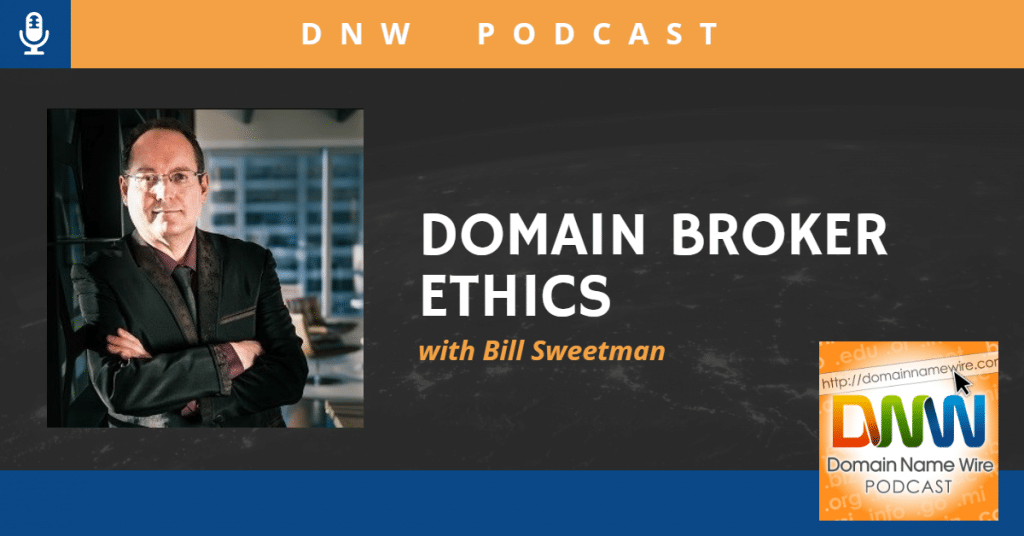How domain brokers, buyers, and sellers should act ethically.

How should domain name brokers behave? On today’s show, domain buyer broker Bill Sweetman of Name Ninja discusses the role of buyer brokers, seller brokers, and buyers and sellers in domain name transactions. There are a lot of shady things that parties to a transaction sometimes do, and Bill explains a simple rule for figuring out if something is ethical or not.
Also: TikTok, domain sales, Pocketbook, and more.
Sponsor: DAN.com
Podcast: Play in new window | Download (Duration: 33:06 — 75.7MB) | Embed
Subscribe via Apple Podcasts to listen to the Domain Name Wire podcast on your iPhone or iPad, or click play above or download to begin listening. (Listen to previous podcasts here.)






From my university ethics class there are some points worth considering:
An individual chooses their morals and values.
A group chooses their ethics, which is analogous to, but not the same as, the individuals chosen morals and values.
For example, when an individual participates in a group who’s ethics are in conflict with the individuals morals and values, that individual is not likely to participate in that group for long (the domain secondary market fails). On the flip side, if the individuals chosen morals and values are in alignment with the groups ethics, the individual is likely to thrive (the domain secondary market thrives).
So in effect, there are no “ethics” until a group comes together to define them, there are only individuals applying their morals and values. Doing that formally allows review by the individual who is not part of the group.
This is an important distinction as current culture confuses this issue even more by rejecting individualism (chosen morals and values) and seeks to impose collective rules (socialism) onto the individual. That is, the individuals choice to participate under a set of ethics is REMOVED. Without the choice, there are no ethics. For example, a buyer and seller need not retain a broker, unless some bureaucrat comes along and requires it but that law is not ethics ……
The Potter Box is an attempt to address the issues involved with a group coming together to form the ethics under which they choose to participate:
https://en.wikipedia.org/wiki/Potter_Box
https://kristinebruunandersen.files.wordpress.com/2018/03/potter-box1.jpg
https://www.semanticscholar.org/paper/Let-%E2%80%99-s-Talk-Ethics-%3A-Privacy-and-Data-Protection-a-Steiner-Kickmeier-Rust/1e8314c448111163ed405567eaddc30ac273a462/figure/0
Its all about relationships, there are always two sides and there will always be differences in their views.
Who’s definition of ethics are you using? Like other terms, ethics has been hijacked by various interest groups and industries who advance their own definitions or meanings, sometimes loose sometimes rigid. You may not intend it, but I’ve seen others make a similar argument path which you allude to in your later paragraphs by equating collective/shared values as ‘socialism’. This is a typical confused notion of self-interested right-wing agenderism, hair-splitting and obtuse speaking.
Morals, values and ethics are related somehow but they can’t be seperated to this extent. Even apparently intelligent professors with phd’s can be incredibly dumb and unwise when they advocate with partisan undertones. Lefty-righty jerks are everywhere and twenty-something year olds are particularly vulnerable to such bs since they lack life-experience. One shitty aspect about uni and essay writing is they not only encourage, but demand a student advance their opinion in a strong way to get top marks. Wisdom can only be acquired through the passage of time together with lived experiences, in addition to a thorough understanding of a topic and all it’s ins and outs. Which means these requirements are totally unrealistic which causes students to prematurely adopt positions which follow a train of logic built on shaky foundations.